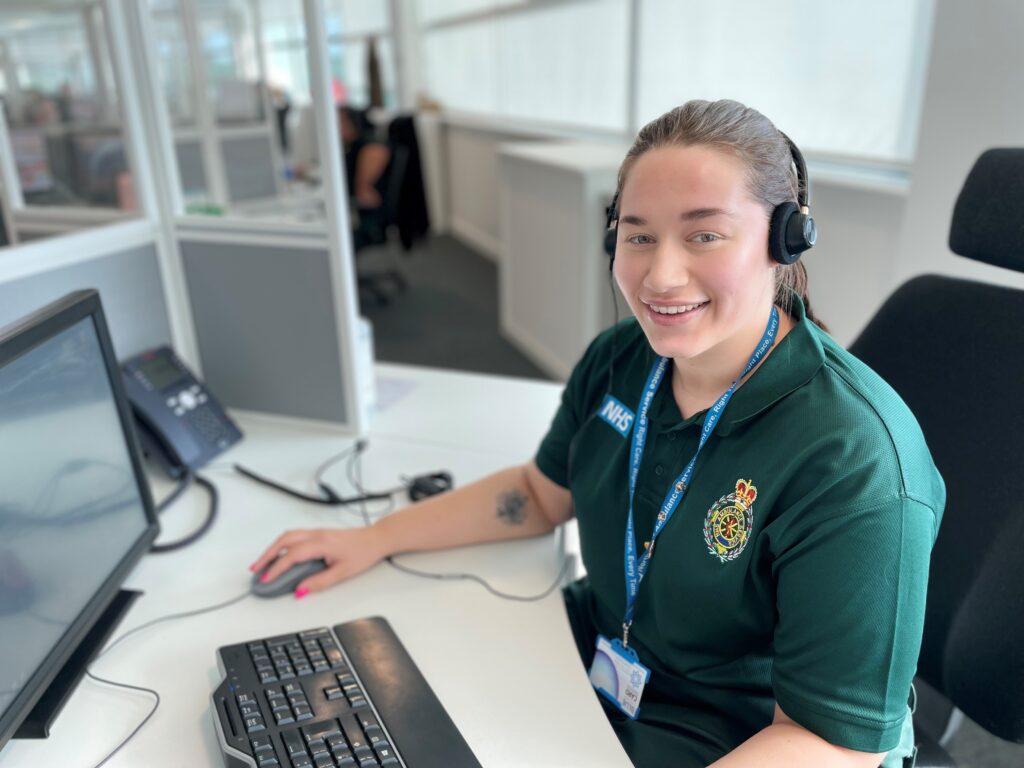
What is a call handler?
The role of a call handler is to:
- Manage a variety of calls from a wide range of different patients
- Complete patient assessments over the phone
- Where applicable, provide clear, correct advice that could potentially save a life, whilst remaining calm under pressure
- Provide reassurance in what may be a very distressing situation
Handling a wide range of calls and thriving amid the challenges this presents, requires an outstanding amount of resilience and emotional strength. You will be supporting unwell and upset patients at their time of need, which will make a difference to lives. It requires people who can be there for those that need it, sometimes in the face of adversity and trauma.
People call the ambulance service for a variety of reasons and not all of these will be a matter of life or death, but you will need to be confident in dealing with a range of people in varying situations. You will be working in a fast-paced environment and must be able to adapt to change quickly and must be aware of the stresses of the role and what impact this may have on you as an individual, considering these points carefully before applying.
What training do I get?
Full training will be given to the successful candidates and an excellent career structure is available for future career progression. Training is six weeks classroom based, working Monday to Friday (0800am-1600pm).
Following the initial training, you will be placed with a mentor for approximately three weeks. You will follow your mentor’s shift pattern during this period.
The complete training package lasts for approximately 10 weeks, therefore annual leave is not allowed during this time.
It is a pre-requisite that candidates must successfully complete the training programme, including all examinations.
What benefits will I receive?
Working for the ambulance service is a rewarding career where each day you’ll know that you’re making a difference.
There are lots of reasons why NWAS is a great place to work, find out more here.
What else do I need to know?
Locations
Our Integrated Contact Centres (ICC) are based at Middlebrook in Bolton, Speke in Liverpool, Broughton near Preston and Whalley Range in Manchester. Candidates should only apply for the advert for the site they wish to work from.
Salary
Band 3. Agenda for Change, including Section 2 payments for unsociable hours.
Basic pay is £24,071, rising to £25,674 after two years. With shift enhancements and unsocial hours payments (excluding overtime), a typical call handler on a basic salary of £25,674 who works approximately 25% of their hours as unsocial hours could expect to earn in the region of £32,160 per annum before tax and deductions
Upon appointment, you will receive 27 days paid holidays. After 5 years service, this rises to 29 days and then 33 days after 10 years of NHS Service. This doesn’t include your additional 8 days for working bank holidays. If you are joining us from another NHS Trust, then your annual leave entitlement will come with you!
Shifts
A full range of shifts will need to be covered and are dependant on service delivery needs, including bank holidays, public holidays, weekends and may include working nights.
Full and part-time positions are available, however please note that if selecting part-time (30 hours minimum), your attendance for the full 10 weeks training would be required on a fulltime basis (37.5 hours per week) should you be successful at the recruitment phase.
Here are some example shift patterns, please note that these example shifts patterns are for illustrative purposes only and are subject to review, therefore these shifts may not be applicable should you be successful with us and are effectively subject to change.
Example 1 (Middlebrook, Bolton and Estuary Point, Liverpool)

Example 2 (Middlebrook, Bolton & Estuary Point, Liverpool)

Example 3 (Middlebrook, Bolton & Estuary Point, Liverpool)

Example 4 (Parkway, Manchester + Estuary Point, Liverpool + Broughton, Preston)

Example 5 (Parkway, Manchester + Estuary Point, Liverpool + Broughton, Preston)

There is an expectation that candidates are flexible and available to accommodate working a number of set shifts per week including weekends.
Due to the nature of the hours only applicants over the age of 18 can apply for this role.